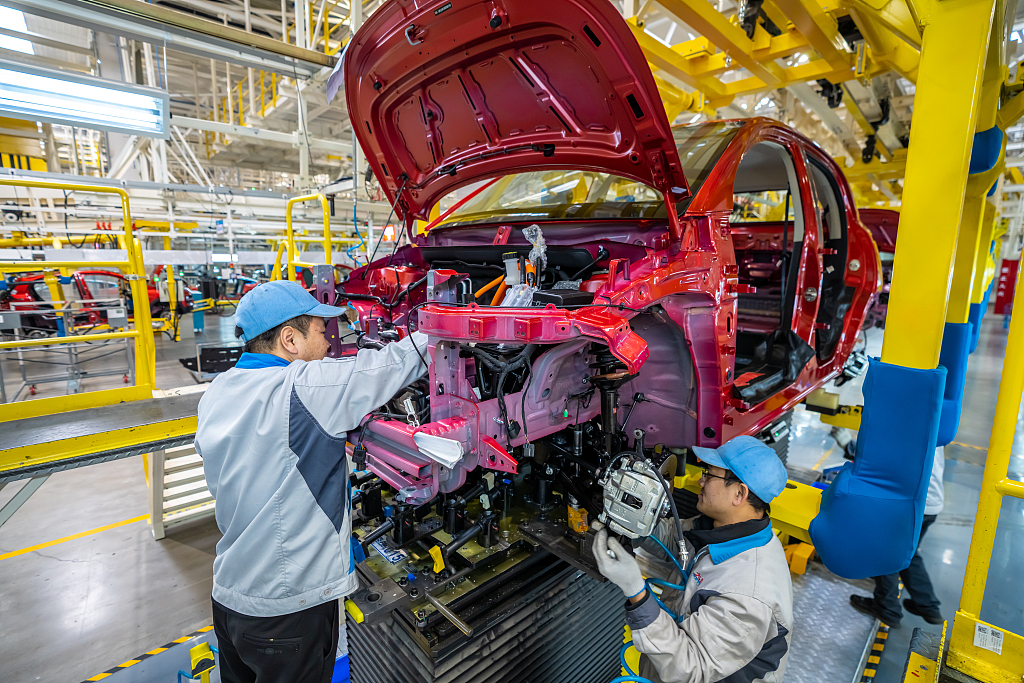
最近一段時間,部分美西方政客和媒體不斷渲染所謂“中國產能過剩論”。分析人士普遍認為,“中國產能過剩論”站不住腳,來自權威機構的數據也不支持所謂的“產能過剩”。“中國產能過剩論”實質上是抹黑和打壓中國經濟的政治工具,其背后凸顯的是逆全球化和貿易保護主義,其結果是阻礙全球貿易,損害各國共同利益。

The so-called "China overcapacity" narrative has been employed by certain Western countries, primarily the United States, as a political tool to tarnish and suppress the Chinese economy, the observers said. Behind the slander lies an agenda of anti-globalization and protectionism that ultimately hinders normal global trade and undermines the common interests of nations, they said.
分析人士指出,以美國為首的部分西方國家將所謂的“中國產能過剩論”作為抹黑和打壓中國經濟的政治工具。其背后是反全球化和貿易保護主義,其結果是阻礙正常的全球貿易,損害各國共同利益。
China holds a significant position in the global supply chain, although that's not due to Chinese policy, but rather the result of companies and consumers worldwide making their own decisions, experts and executives said. After all, they added, China, as the world's second-largest economy, has a comparative advantage in its economic model — one that makes it the go-to manufacturing hub of the world.
多位經濟學家和跨國企業高管表示,中國在全球供應鏈中占據重要地位,這是全球企業和消費者自主決策的結果,而不是中國的政策決定的。作為世界第二大經濟體,中國的經濟模式具有比較優勢,使其成為世界制造業的中心。
Albert Park, chief economist at the Asian Development Bank, said concerns about Chinese exports in terms of overcapacity are not supported well by evidence, noting that the World Trade Organization addresses noncompetitive practices with anti-dumping and countervailing duties, and there is no strong evidence that either applies to China.
亞洲開發銀行首席經濟學家樸之水表示,對“中國輸出過剩產能”的擔憂證據不足。他指出,世界貿易組織通過征收反傾銷稅和反補貼稅解決不當競爭問題,但沒有有力的證據表明這兩種做法適用于中國。
On the contrary, a critical issue facing the world today is not an oversupply of green energy capacity, but rather a severe shortage. According to the International Energy Agency, annual sales of electric vehicles are projected to reach 45 million units by 2030, more than four times the demand in 2022.
當今世界面臨的關鍵問題不是綠色能源產能過剩,而是嚴重短缺。據國際能源署測算,2030年全球新能源汽車需求量將達4500萬輛,是2022年的4倍多。
Robin Xing, chief China economist at Morgan Stanley, said, "It is unfair to specifically mention China's industrial policies and imply that China's competitive advantage is subsidized by the government", as many countries are allocating government subsidies and introducing industrial policies to boost strategic industries and productivity.
摩根士丹利中國首席經濟學家邢自強稱,“刻意針對中國的產業政策、并暗示中國的競爭優勢是靠政府補貼,這是不公平的”,因為許多國家正在通過政府補貼和相應產業政策促進戰略性產業和生產力的發展。
For instance, the US Inflation Reduction Act — the largest US investment ever in clean energy and climate action — was signed into law by US President Joe Biden, and the White House has awarded billions of dollars in subsidies for advanced semiconductor manufacturing.
以美國為例,美國總統喬·拜登簽署了《通脹削減法案》,這是該國有史以來對清潔能源和氣候行動的最大投資,白宮已為先進半導體制造業提供數億美元的補貼。
In the lead-up to the US presidential election in November, politicians are increasingly using issues of overcapacity and the trade imbalance with other countries for political leverage, with political considerations taking precedence over genuine economic concerns, observers said.
分析人士稱,在十一月美國大選前夕,一些政客將所謂“中國產能過剩論”和與其他國家的貿易不平衡問題作為政治籌碼,其政治考慮優先于真正的經濟關切。
Yao Yang, director of the China Center for Economic Research at Peking University, said: "The Biden administration claims to uphold a worker-centered trade policy, and its recent moves, from raising the capacity issue to launching a trade probe against China, are more like gestures to please and curry favor with certain groups of voters, rather than pursuing any economic considerations.
北京大學中國經濟研究中心主任姚洋表示:“美國政府聲稱其貿易政策為‘以工人為中心’”,從炮制‘中國產能過剩論’到對中國發起貿易調查,其近期舉措更像是為取悅和討好某些選民群體做姿態,而非出于經濟考慮。
英文來源:中國日報
編輯:董靜
審校:萬月英 陳丹妮